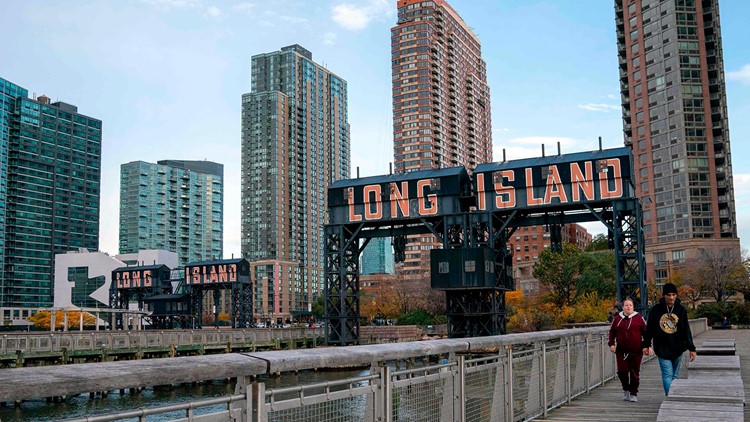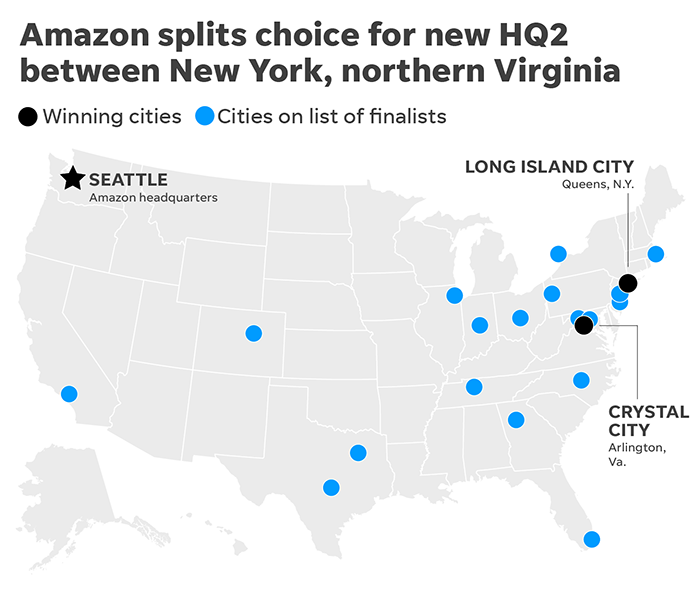Amazon's selection of New York City and Arlington, Virginia, for its new headquarters — as well as Nashville for a major investment — leaves major cities throughout the country wondering what could have been.
As Amazon dangled the prospect of 50,000 jobs and economic transformation, virtually every major city in the country jockeyed to win an economic development race for the ages.
But cities such as DFW, Chicago, Denver, Pittsburgh, Phoenix, Miami and Los Angeles were ultimately left empty-handed.
Did those cities get played? Did they ever have a legitimate shot at winning this race?
Critics say Amazon exploited the list of contenders for the sake of learning more about their secret plans for infrastructure investments, economic development and tax incentives.
And it's hard to escape the fact that after about 14 months of consideration, Amazon ended up picking two of the richest areas in the country: New York and Washington, D.C.
While D.C. technically didn't win the so-called HQ2 sweepstakes — Arlington is just across the Potomac River — the District will inevitably benefit from the halo effect of Amazon establishing what it called its "new Washington, D.C. metro headquarters."
"Cities all around the country bent over backwards to try to apply," said Calandra Cruickshank, CEO of StateBook International, a provider of economic development data. "Amazon certainly got a wealth of information about what properties and incentives and attributes different communities have to offer."
Critics say Amazon can use that information to make future investment decisions.
But Cruickshank defended Amazon's process, saying that ultimately many cities that submitted applications benefited from the process. The process enabled those applicants to refine their pitches to prospective investors and identify areas where they need to improve, such as transit, labor and quality of life, she said.
After a brief period in which hundreds of cities were in the mix, Amazon had narrowed it down to 20 contenders. Some areas had multiple contenders on the list, such as D.C. itself, southern Maryland and northern Virginia, which ultimately prevailed.
"I feel like the process was pretty carefully done and these other communities really did have a chance," Cruickshank said.
Resentment, however, is already building.
Amazon critic Stacy Mitchell, co-director of the Institute for Local Self-Reliance, called the search process "a giant ruse" and said the selection of Nashville for 5,000 jobs is "a head-fake" that will fool "many journalists" into not applying appropriate scrutiny to the online giant.
Amazon, she said on Twitter, is a monopoly that will use the new headquarters to extend its influence over the news media capital of New York and the center of government in D.C.
"Amazon is expanding in the nation’s two major centers of power, because it intends to envelope, smother and usurp that power for itself," Mitchell wrote.
One alternative view: Cities that lost actually won. Critics of tax incentives say cities shouldn't hand over the kitchen sink to corporations like Amazon.
"Despite arguments in support of economic development subsidies, both theory and experience suggest that cities and states are throwing their money away when they court Amazon’s favor through subsidies," wrote Michael Farren, research fellow at George Mason University's Mercatus Center, which conducts research promoting free market policies, in a report.
He said "these kinds of targeted economic development incentives fail to produce economic growth."
From the beginning, Amazon described its HQ2 search process as a plan to diversify its base of operations away from its main headquarters in Seattle. The company has said it seriously considered areas throughout the country.
Amazon did not immediately respond to requests seeking comment.
“We are excited to build new headquarters in New York City and Northern Virginia,” Amazon CEO Jeff Bezos said in a statement. “These two locations will allow us to attract world-class talent that will help us to continue inventing for customers for years to come. The team did a great job selecting these sites, and we look forward to becoming an even bigger part of these communities.”
Contributing: Elizabeth Weise




